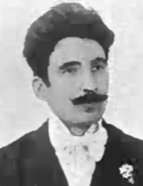

Vale de Açores, Mortágua, 1881 – Parede, Cascais, 1971
Although he has never dedicated him a monograph like the ones he did on Eça de Queiroz and Guerra Junqueiro, Lopes de Oliveira paid some attention to the work of Oliveira Martins. In one of the texts he published in the collection Cadernos Históricos, organized in partnership with Rocha Martins, he focused on the political programme of Oliveira Martins, and on the enlargement of the royal power that the latter defended in the last years of his life. In 1947, two texts of Oliveira Martins were released in the journal Seara Nova – Liberdade de cultos and Ultramontanismo –, having been published by the initiative of Lopes de Oliveira and followed by an extensive note written by him. The following year, these texts were included in a compilation of Oliveira Martins’ writings organized and published by the republican historian under the title Páginas Desconhecidas. Aside from the texts of the nineteenth-century author – all of them from the 1870s and identified by Lopes de Oliveira for the first time –, this edition also includes an introductory study written by Lopes de Oliveira, in which the historian outlined a biographical sketch of the author of Portugal Contemporâneo. Focusing simultaneously on aspects of the public-private life of Oliveira Martins and of his work as a writer, the republican historian concluded that the change of direction of Oliveira Martins’ thought, often highlighted by the critics, was in the end “more apparent than real”, being more a change of words than of ideas. Lopes de Oliveira was also a collaborator of several journals – from Correio de Mortágua and A Beira to Diário de Lisboa and República –, and published papers in various journals, such as Atlântida, Livre Pensamento, and Seara Nova.
Considered a “figure of the Republic” (Diário de Lisboa, 04-08-1971, p. 1) and “one of the last men of the nineteenth century”, not only for “his strong and powerful personality”, but also “for the breadth of his points of view” (Diário de Lisboa, 29-01-1958, p. 7), Lopes de Oliveira would die on August 3rd, 1971, in Parede, Cascais.
